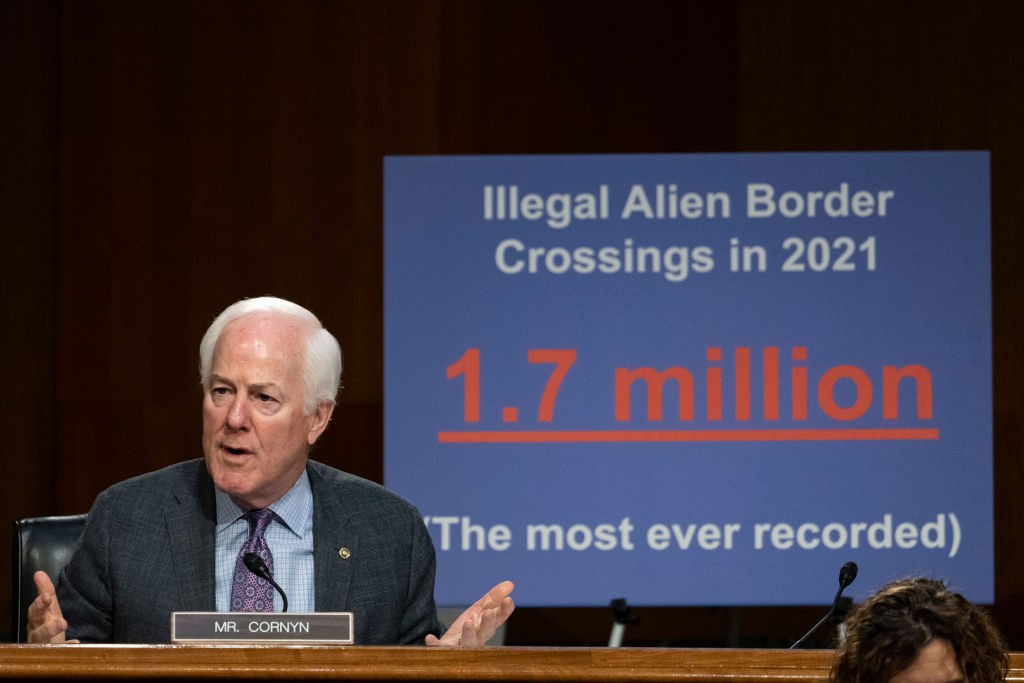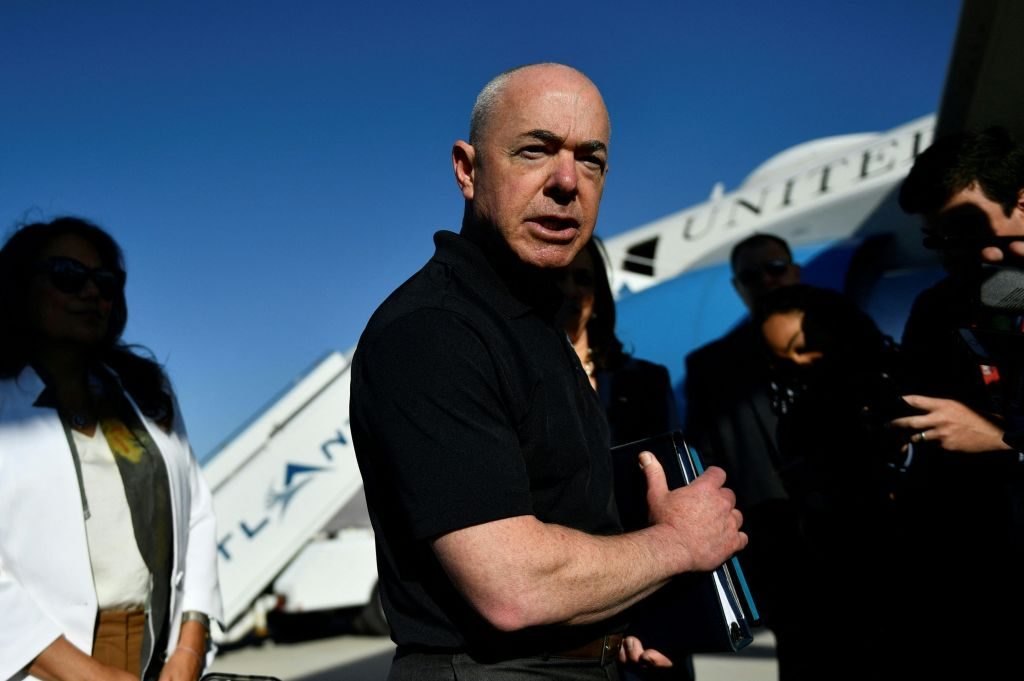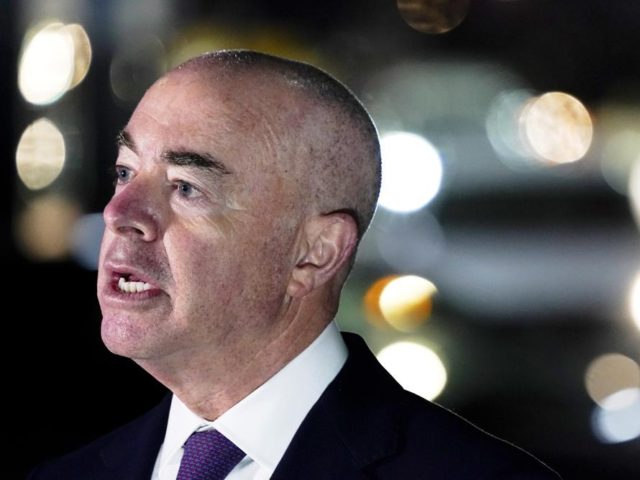President Joe Biden’s Cuban-born border chief Alejandro Mayorkas is welcoming a massive Cuban migration into the United States, just as Cuba’s communist government is letting pro-democracy protestors leave the island prison.
In March, “more than 32,000 Cubans were taken into U.S. custody along the Mexico border, double the number who arrived in February, ” says a report in the Washington Post. The government “is on pace to apprehend more than 155,000 Cubans during the current fiscal year, records show, nearly four times the 2021 total and a twelvefold increase over 2020.”
“Almost everyone from the younger generations is leaving … [it is] a stampede,” Maria Victoria Gonzalez told the Washington Post.
“Bray Perez, a 19-year-old Cuban university student, is fast losing friends to a growing wave of migration off the island,” Reuters reported on March 17. “Every time I go home, I find that 10 people have left … It’s hard to get up in the morning and know I’m not going to see them anymore,” he added.
The migrants are flying into Nicaragua and then traveling by road through Mexico to the U.S. border, which is being opened to Cuban migrants by border chief Alejandro Mayorkas.
“I don’t think he has a secret pro-Cuban [government] agenda,” said Mark Krikorian, director of the Center for Immigration Studies. “But that’s the actual effect of his policy.”
Department of Homeland Security (DHS) Secretary Alejandro Mayorkas used his visit to the United States-Mexico border with Vice President Kamala Harris to tout amnesty for illegal aliens. https://t.co/mRWXhNrtNw
— Breitbart News (@BreitbartNews) June 27, 2021
Mayorkas was born in Cuba, but his parents were invited by Americans to live in the United States in 1960 because Cuba’s communist government stole private property and murdered opponents.
Mayorkas still identifies as an immigrant and is using his job — he is secretary of the Department of Homeland Security — to maximize the inflow of poor migrants into Americans’ homeland.
That multinational flood is suppressing Ameicans’ wages, spiking their housing costs, and helping keep millions of Americans out of the workforce.
Under the Title 42 border rules, Mayorkas has full authority to expel the migrants — even if their dictatorial government refuses to take them back. But, “according to preliminary data obtained by The Post, U.S. Immigration and Customs Enforcement (ICE) has only deported 20 Cubans in the past five months, and just 95 during the 2021 fiscal year,” the Washington Post reported.
Mayorkas also has a limited authority to allow Cubans into the United States under a so-called “parole” exemption to normal border rules. The authority was created by the Cold War-era Cuban Adjustment Act of 1966, and it also allows paroled Cubans to get fast-track green cards and then citizenship.
In May, the U.S. Embassy in Cuba will reportedly begin accepting requests from Cuban parents to visit their emigrant children in the United States. Many may hope to stay in the United States to benefit from much better healthcare programs.
Mayorkas’s welcome for migrants is “in effect, a dictatorship support program” for Cuba’s dictatorship, said Krikorian. “The communists in Cuba use immigration the way other oppressive regimes sometimes do — to release some of the built-up steam, built-up discontent … as a way to maintain their hold on society,” he told Breitbart News.
DHS Secretary Alejandro Mayorkas attempts to present the facts of what the Biden Administration views as a “challenge” along the southern border. Mayorkas admits the situation is worsening. https://t.co/iC11DayGz6
— Breitbart News (@BreitbartNews) March 16, 2021
“Our immigration policy has had negative effects on various countries in different ways for years and years,” said Rosemary Jenks, director of government relations for NumbersUSA. For example, “by bringing all of the motivated and educated and resourced people from a very poor country to the United States, that harms that [poor sending] country,” she said.
U.S. government policies — including loose borders — have extracted at least 15 million young, hard-working people from Mexico and Central America. Once in the United States, the migrants are used as workers, consumers, and renters. The population transfer hinders economic trade with the United States and makes it more difficult for the migrants’ home countries to grow out of poverty and chaos.
“The compassionate thing to do is to reduce that flow,” Jenks said.
The emigration also generates cash for Cuba’s communist government once the migrants send U.S. wages back to their families, he said. “It’s become easier and easier over the years to send remittances from the United States to Cuba, and obviously, the Cuban regime benefits in a variety of ways from that money,” he said, adding that some of the welfare aid from the federal government to Cuban migrants will end up in Cuba.

Sen. John Cornyn (R-TX) questions Department of Homeland Security Secretary Alejandro Mayorkas during a Senate Judiciary Committee hearing on oversight of the Department of Homeland Security, on Capitol Hill November 16, 2021 in Washington, DC. (Drew Angerer/Getty)
Cuba’s autocrats are facing rising protests, according to an April 5 report in the Miami Herald. The article was headlined “More than 46,000 Cubans, biggest wave in years, have arrived in the U.S. in five months,” and it said:
With a soaring inflation rate, widespread shortages of basics and little prospects for economic recovery from the impact of the pandemic, Cuba topped the worldwide “misery index” in 2021, compiled annually by John Hopkins University economist Steve Hanke. After widespread protests last year seeking regime change and improved living conditions, the government made some minor reforms to the private sector with little effect on the larger economy, which follows a centralized socialist model.
Cuban authorities also launched an all-out assault on civic liberties, passing decrees and legislation further restricting freedom of expression and other civil rights while arresting more than 1,400 people, including several minors, for participating in the islandwide protests last July 11. Harsh sentences meted out to the protesters have also sent a chilling message, and many young Cubans are seeking to start a new life elsewhere.
“The Cuban economy is in a deep crisis,” said Camilo Condis, a young Cuban entrepreneur who co-hosts the podcast El Enjambre, Spanish for swarm. “Although it is true that the COVID-19 pandemic and the [U.S. ] sanctions have negatively affected the economy, the Cuban government has not taken any measures to promote development within the country and continues to bet on a failed centralized economy.”
But Mayorkas is not specifically trying to help the communist regime that pushed his parents into exile, said Krikorian:
He is, in fact, helping the Cuban regime, but he’s helping every other regime that wants its discontented population to emigrate. I can’t imagine Mayorkas’ actions are in any way targeted toward Cubans — he’s unwilling to enforce the [U.S.] immigration law against anybody.
Migration advocates welcomed the additional inflows — and jeered at advocates for reduced migration.
That should make #Cuba the number-2 country of origin, after Mexico, of March migrants at the US-Mexico border. Never happened before.
How does the “Biden Border Crisis” crowd respond? Would Rubio, DeSantis, Scott ship them to the regime in Havana? Make them "remain in Mexico?" https://t.co/YNMLzbGhTI
— Adam Isacson (@adam_wola) April 7, 2022
The Washington Post reported that the poor Cubans are borrowing funds to pay the smugglers’ networks in the expectation that they will travel to Nicaragua, then Mexico, then across the U.S. border, and into U.S. jobs.
Cubans “are smart and they’ve concluded that it’s worth it to borrow the money to get to the United States,” Krikorian said. “What that does is benefit smugglers, benefits the communist regime, benefits the migrants themselves — and the losers are American workers and American taxpayers.”
Since at least 1990, the D.C. establishment has used a wide variety of excuses and explanations — for example, “Nation of Immigrants” — to justify its policy of extracting tens of millions of migrants and visa workers from poor countries to serve as workers, consumers, and renters for various U.S. investors and CEOs.
The self-serving economic strategy of extraction migration has no stopping point. It is brutal to ordinary Americans because it cuts their career opportunities, shrinks their salaries and wages, raises their housing costs, and has shoved at least ten million American men out of the labor force.
Extraction migration also distorts the economy, and curbs Americans’ productivity, partly because it allows employers to use stoop labor instead of machines.
Migration also reduces voters’ political clout, undermines employees’ workplace rights, and widens the regional wealth gaps between the Democrats’ coastal states and the Republicans’ Heartland states.

Secretary Of Homeland Security Alejandro Mayorkas looks on at El Paso International Airport, on June 25, 2021 in El Paso, Texas. (PATRICK T. FALLON/AFP via Getty Images)
An economy built on extraction migration also alienates young people and radicalizes Americans’ democratic, compromise-promoting civic culture because it allows wealthy elites to ignore despairing Americans at the bottom of society.
The economic strategy also kills many migrants, exploits poor people, splits foreign families, and extracts wealth from the poor home countries.
The extraction migration policy is backed by progressives who wish to transform the United States from a society governed by European-origin civic culture into a progressive-led empire of competing identity groups. “We’re trying to become the first multiracial, multi-ethnic superpower in the world,” Rep. Ro Khanna (D-CA), told the New York Times on March 21. “It will be an extraordinary achievement … we will ultimately triumph,” he insisted.
Not surprisingly, the wealth-shifting extraction migration policy is very unpopular, according to a wide variety of polls.
The polls show deep and broad public opposition to labor migration and the inflow of temporary contract workers into jobs sought by young U.S. graduates.
The opposition is growing, anti-establishment, multiracial, cross-sex, non-racist, class-based, bipartisan, rational, persistent, and recognizes the solidarity that Americans owe to one another.

COMMENTS
Please let us know if you're having issues with commenting.